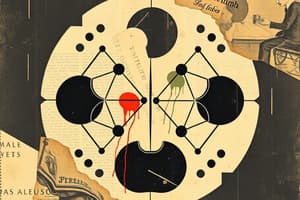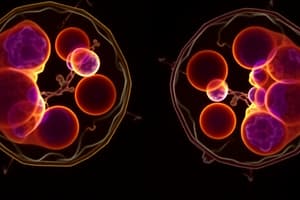Podcast
Questions and Answers
During which phase of mitosis do the chromatids separate and move to opposite poles of the cell?
During which phase of mitosis do the chromatids separate and move to opposite poles of the cell?
- Metaphase
- Prophase
- Telophase
- Anaphase (correct)
What is the primary purpose of mitosis in multicellular organisms?
What is the primary purpose of mitosis in multicellular organisms?
- Growth and repair of tissues (correct)
- Production of gametes
- Introduction of genetic variation
- Asexual reproduction in single-celled organisms
Which of the following events occurs during the S phase of the cell cycle?
Which of the following events occurs during the S phase of the cell cycle?
- Cell growth and protein synthesis
- Organelle formation for mitosis
- Cell division
- DNA replication (correct)
How many chromosomes are present in a human diploid cell?
How many chromosomes are present in a human diploid cell?
What is the main outcome of meiosis?
What is the main outcome of meiosis?
In which phase of meiosis does crossing over occur, leading to genetic diversity?
In which phase of meiosis does crossing over occur, leading to genetic diversity?
During which phase of mitosis does the nuclear envelope reform and cytokinesis begin?
During which phase of mitosis does the nuclear envelope reform and cytokinesis begin?
What distinguishes metaphase I of meiosis from metaphase in mitosis?
What distinguishes metaphase I of meiosis from metaphase in mitosis?
What is the significance of homologous pairs in meiosis?
What is the significance of homologous pairs in meiosis?
Which event occurs during anaphase I of meiosis?
Which event occurs during anaphase I of meiosis?
If a cell with 2n=46 undergoes meiosis, what will be the chromosome number in each daughter cell at the end of meiosis II?
If a cell with 2n=46 undergoes meiosis, what will be the chromosome number in each daughter cell at the end of meiosis II?
During which phase of the cell cycle does the cell synthesize proteins and grow?
During which phase of the cell cycle does the cell synthesize proteins and grow?
Which of the following cells are produced through meiosis?
Which of the following cells are produced through meiosis?
What happens during the G2 phase of the cell cycle?
What happens during the G2 phase of the cell cycle?
Which process does NOT contribute to genetic diversity?
Which process does NOT contribute to genetic diversity?
What is the chromosome number of a human haploid cell?
What is the chromosome number of a human haploid cell?
During which phase of meiosis II do sister chromatids separate and move to opposite poles?
During which phase of meiosis II do sister chromatids separate and move to opposite poles?
What is the final result of mitosis?
What is the final result of mitosis?
Which stage of meiosis is most similar to mitosis?
Which stage of meiosis is most similar to mitosis?
What is the purpose of meiosis?
What is the purpose of meiosis?
Flashcards
Mitosis: Purpose
Mitosis: Purpose
Cell division for growth, repair, and asexual reproduction.
Prophase
Prophase
Chromosomes condense.
Metaphase
Metaphase
Chromosomes align in the middle of the cell.
Anaphase
Anaphase
Signup and view all the flashcards
Telophase
Telophase
Signup and view all the flashcards
G1 Phase
G1 Phase
Signup and view all the flashcards
S Phase
S Phase
Signup and view all the flashcards
G2 Phase
G2 Phase
Signup and view all the flashcards
M Phase
M Phase
Signup and view all the flashcards
Meiosis: Purpose
Meiosis: Purpose
Signup and view all the flashcards
Haploid
Haploid
Signup and view all the flashcards
Diploid
Diploid
Signup and view all the flashcards
Homologous Pairs
Homologous Pairs
Signup and view all the flashcards
Prophase I
Prophase I
Signup and view all the flashcards
Metaphase I
Metaphase I
Signup and view all the flashcards
Anaphase I
Anaphase I
Signup and view all the flashcards
Telophase I
Telophase I
Signup and view all the flashcards
Prophase II
Prophase II
Signup and view all the flashcards
Metaphase II
Metaphase II
Signup and view all the flashcards
Anaphase II
Anaphase II
Signup and view all the flashcards
Study Notes
- Mitosis, the cell division process, serves purposes such as growth, repair, and asexual reproduction
Stages of Mitosis
- During prophase, genetic material condenses
- During metaphase, the condensed materials align across cell
- During anaphase, chromatids separate and move apart
- During telophase, cytokinesis occurs, and the nuclear envelope reforms
Cell Cycle
- G1 (Growth one) phase involves cell growth and protein synthesis
- S (Synthesis) phase involves DNA replication in preparation for mitosis
- G2 (Growth two) phase involves the formation of organelles needed for mitosis
- M (Mitosis) phase involves cell division
Meiosis
- Meiosis serves to produce gametes for reproduction, resulting in haploid cells
- Mitosis produces diploid cells, while meiosis produces haploid cells
Haploid vs Diploid
- Haploid cells, such as sex cells, contain 23 chromosomes
- Diploid cells, such as somatic cells, contain 46 chromosomes
Homologous Pairs
- Homologous pairs are two chromosomes with different alleles combined
Stages of Meiosis
Meiosis I
- Prophase I involves partner chromosomes aligning instead of condensing, where DNA is broken and swapped through crossing over to create genetic diversity
- Metaphase I involves homologous pairs, not individual chromosomes, lining up for separation
- Anaphase I involves homologous pairs being pulled apart
- Telophase I involves chromosomes arriving at opposite ends of the cell followed by cytokinesis
Meiosis II
-
Prophase II involves chromosomes condensing and the nuclear envelope breaking down
-
Metaphase II involves chromosomes lining up individually along the metaphase plate
-
Anaphase II involves sister chromatids separating and moving to opposite sides of the cell
-
Telophase II involves the nuclear envelope reforming, chromosomes decondensing, and cytokinesis splitting chromosomes into haploid daughter cells
-
The final outcome of meiosis is the production of four haploid cells
Studying That Suits You
Use AI to generate personalized quizzes and flashcards to suit your learning preferences.




